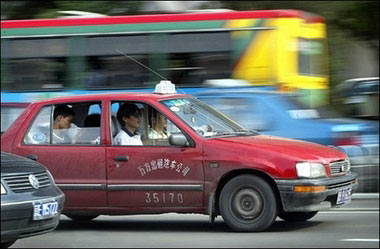
A
Beijing taxi. Fuel-efficient cars with low emissions proved popular in
China's auto market in the first half of this year, accounting for half of
the top-10 best selling vehicles. [AFP] |
Fuel-efficient cars with low emissions proved popular in China's auto market
in the first half of this year, accounting for half of the top-10 best selling
vehicles.
Xiali, manufactured by the Tianjin FAW Xiali Automobile Co. Ltd. and popular
for its low energy-consumption, kept its number one position on the list of top
selling low-emission cars, Xinhua news agency said.
The company sold 93,800 Xiali vehicles in the first six months of this year,
said Xinhua, which cited statistics from the China Association of Automobile
Manufacturers.
Xiali was followed by the Excelle of Shanghai General Motors and the Elantra
from Beijing Hyundai, with sales of 86,900 and 85,400 respectively.
Insiders attributed the popularity of low-emission cars to soaring oil prices
and preferential government policies on vehicles with low emissions, Xinhua
said.
China has raised the price of processed oil twice in the first half of this
year, hiking costs by 300 yuan (US$37.5) per ton in March and by 500 yuan per
ton in May.
Earlier this year, the government also began promoting small, low-emission
cars as oil prices remained high and environmental concerns grew over the
nation's fast-rising auto culture.
It ordered the lifting of restrictions on small cars, which were banned by
some local governments due to fears that the cheaper vehicles would cause an
explosion in vehicles on the road.
The government is also considering creating a new tax system for the auto
industry that would promote low-emission cars and penalise large,
petrol-guzzling vehicles.
Consumption taxes on vehicles with engines smaller than one litre may be cut
from three to one percent, while taxes on engines bigger than three litres are
likely to rise from eight percent to 14-20 percent, the paper said.
The number of private cars on China's roads has nearly tripled in five years,
with previously released government data showing there were around 17 million
last year, up from 6.25 million in 2000.